Zambia’s minister of religious affairs and national guidance, the Honourable Reverend Godfridah Sumaili spoke with the Zambia Blog Talk Radio on Saturday, May 20, 2017. I found her sentiments in that interview to be deeply disturbing. Rev. Sumaili sounds like a very good person. However, tyranny when perpetrated by good people is very difficult to resist. Tyranny that comes in the vessels of blood is far much easier to identify and resist than the one that comes through the honourable vessels of splendour. The more splendorous the vessels of tyranny appear, the greater the duty for vigilance. Nevertheless, tyranny is tyranny regardless of which vessel it uses. For the reasons that follow, I find that the Hon. Rev. Godfridah Sumaili has fundamentally misunderstood the Zambian constitution.
Rev. Sumaili believes that the ministry of religious affairs is trying to operationalise the declaration of Zambia as a Christian nation. This is boloney from a constitutional perspective. Zambia is a Christian nation, but the declaration of Zambia as a Christian nation does not confer reliable rights on Christians. The Zambian constitution has not given Christians more constitutional rights than members of different faiths or sects. It is wrong for Rev. Sumaili to state that now the Zambian government will operationalise the declaration of Zambia as a Christian nation. Zambian Christians, particularly those of the faith of the honourable reverend (which is my faith too), need to take the time to read the whole paragraphs of the constitution. The preamble to the constitution of Zambia declares the republic to be a Christian nation. But it does not end there. It states further that “…while upholding a person’s right to freedom of conscience, belief or religion” (Constitution of Zambia, 2016). Constitutionally then, Zambia is both a Christian nation AND a nation that upholds freedoms of conscience, belief or religion. Rev. Sumaili cannot as a representative of the political state pick and choose what she wants from the constitution.
During the interview, Rev. Sumaili’s analogies were even more problematic. She stated that just as a home has values, so should a nation. She is advancing a very dangerous paternalism that is not envisioned by the constitution of Zambia. Zambia is not a home with a father and mother ruling over children in a household. The biblical model of a home cannot be extrapolated to the Zambian state. Zambia is a republic with a constitution that assigns roles to each branch of government. Zambian citizens are responsible adults with rights and privileges afforded to them, not by custom, or the Bible, but by the constitution of the republic. What Rev. Sumaili has stated will erode constitutional liberties. Values in the home, are not the same as values that keep a democratic republic viable. You can’t stand up to your father in the home, but our constitution allows citizens to stand up to political leaders. Mr. Lungu is head of a democratic state and not an monocratic home. If Rev. Sumaili so passionately believes in home values for Zambia, perhaps she can start with trying to instill those values in members of her cabinet. She is welcome to do that, but she is not welcome to analogise the republic of Zambia as if it were a home with Mr. Lungu as the father and Mrs. Esther Lungu as the mother.
Rev. Sumaili is proposing that the Zambian churches should be regulated by the church mother bodies. This is nonsense. I appeal to all Zambians of good faith to resist this maneuver. The church mother bodies cannot regulate the practise of religion. Churches differ in doctrines. Pentecostals speak in tongues, a practice that Baptists find intolerable. Are you going to let Baptists regulate the practice of the pentecostal faith? What about Sabbath worship? Is the church mother body going to regulate who should worship on which day? Even if the government intended that churches regulate themselves, that too would be unacceptable at very basic theological level. There is no formula to religion and certainly when the state claims to have found a formula to religion it becomes a false prophet.
Asking for self-regulation of the churches is also intolerable as a matter of constitutional law. The Zambian Bill of Rights has not envisaged a situation where the fundamental freedom to worship would be subjected to regulation by the state or its administrative delegate. Zambia is not Russia where a despot can wake up one morning proclaim themselves to be a state prophet and ban the Jehovah’s Witnesses. Had the Bill of Rights envisaged government control of religion, it would have plainly said so. The fundamental right to choose one’s religion cannot be abrogated by the state. The Zambian state cannot pass laws that control how Zambians must exercise their freedom of religion. Freedoms that should pass regulatory control for them to be exercised are not freedoms at all. When the state begins to regulate how, where, when and what a person should and cannot say, tyranny begins. To be very clear: Rev. Sumaili might as well continue to dream on, but the Bill of Rights has not given her the power, nor the right to regulate or propose regulation of the freedoms of worship.
Rev. Sumaili does seem to suggest that Zambia must be led according to the Bible, but she fundamentally misunderstands the practical application of such a concept. Now this is the most misunderstood concept. Theologically, the Holy Bible is God’s Word. It is the rule of faith and personal conduct, it is not the rule of Zambia’s constitutionalism. The Holy Bible is not the constitution of Zambia and is not a source of Zambian law. Zambia is not a church, it is a republic. I hope that some leaders in Zambia would lead according to the precepts of the Bible, but the precepts of the Bible do not form part of the constitution of Zambia. The Republic of Zambia is governed according to its constitution. You cannot violate the constitution of Zambia and justify such violation by quoting from the Bible. The God of the Bible has gifted Zambians with a constitution to govern themselves. Rev. Sumaili should follow the constitution and respect it or if she is not prepared to respect the constitution must resign.
Rev. Sumaili makes no legal sense and she certainly makes no theological sense. A government minister who fundamentally misunderstands and undermines the constitutional structure of our republic is unworthy to serve the people of Zambia. I call upon her to resign.
This article was first posted on Elias Munshya’s blog on May 22, 2017.

























3 responses
Has she even read the Constitution? She was a commissioner at the Human Rights Commission in charge of child rights when she could not even quote a single article of the national, regional or international child rights framework! When civil society stayed away from the NCC she wangled her way into it. She thrives on her so called soft voice, so called dignified and of course the number 1 Zambian leadership criteria – so called humbleness when her bottom line is ‘whats in it for her.’
Not being a Christian I am yet aware that a tenet of the faith is that a person gains salvation through his or her personal relationship with Jesus Christ who gave his life as atonement for that persons sin. It is through Jesus Christ that an individual will enter into the loving presence of God the Father in heaven on his demise. Like the writer I am interested in religion so I am also aware that a Christian can be recognized by his works. Zambia is no more a Christian nation because it has been so labeled than any other nation with a preponderance of people who tick a box in a census marked religion, Christian. Political Christianity has many precedents and very ugly some manifestations of this have been and these are well documented. What the Minister is trying to do is to replace a personal contract between God and an individual with a set of rules which she thinks will provide a national culture. I think she is barking up a wrong tree. To try to mimic the Islamic State such as Saudi Arabia or Iran denies the differences that exist between Christianity and Islam and in the case of Zambia the many different components of the national culture. She can expect to meet stiff resistance to attempts to walk all over those cultural influences as the language she Is reported as using indicates she plans to do. Some of us are grew up in places and at a time where the differences of centuries of sectarian violence between Catholics and Protestants were only just being patched up by civility. .Elias Munshya is correct in saying that within Christianity there exists many serious points of difference which provide the fundemental reasoning for the existence of their churches. Trying to pick and choose amongst them to create the paradigm for the so called Christian state is a recipe for disaster and we know this because history tells us so. Without any religion myself I was still angered when the Christian group who had the control of a funeral service of a relative tried to stop the performance of mugubo, the mourning ngoma because the church does not allow it. Yet the the departed man had loved his ngoma just as he loved his church choir who had performed admirably till that point. That was six years ago but my original reaction to the incident has not much faded. Religion is many things to many people and for real peace and unity it is important that Christians in Zambia realize that membership in theirs is voluntary and there is no tax extracted for not belonging just as all the human rights belong to everyone, with out a religion..
I would also have to add that she is the minister of RELIGIOUS AFFAIRS not just christian affairs.